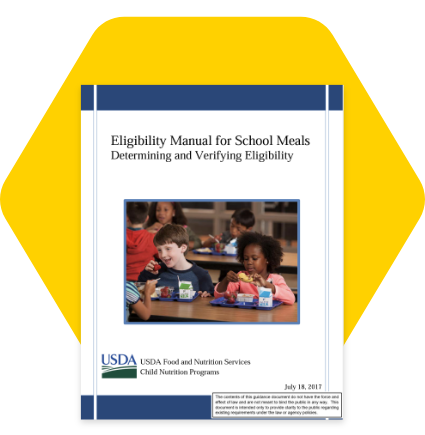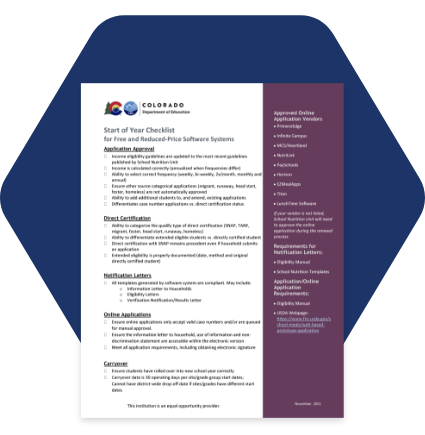You are here
Determine Program Eligibility

School Meal Eligibility is determined at the district level by households completing a free or reduced-price application. Households can also be automatically eligible for free school meals through direct certification.
Qualifying students as eligible for free or reduced-price school meals helps to increase access to healthy meals, which supports their health and academic performance.
Jump To:
School Meal Eligibility Overview
Sponsors must provide, collect, and determine student eligibility for meal benefits using household income applications or via direct certification. Sponsors receive federal reimbursement for meals served to students based on the USDA established reimbursement rates for each eligibility category: free, reduced-price or paid meals.
Sponsors participating in the Healthy School Meal Program provide all students no-cost meals regardless of their eligibility status. However, it’s important for households to complete household income forms to ensure sponsors maximize the federal reimbursement they receive and ensure households receive additional benefits they qualify for, such as reduced school fees.
For the National School Lunch Program and School Breakfast Program, all disclosure requirements for release of student eligibility for non-meal program needs will apply. Public school districts operating National School Lunch Program must report free and reduced-price eligibility totals for the annual At-Risk/Free Lunch October Count.
Best practices to encourage families to provide household income information:
- Provide consistent and clear communication on how families can apply
- Promote online application as a component in online school registration
- Include application and return instructions in Friday folders
- Mail paper applications with pre-paid return envelopes or designate a drop-off point
- Hold office hours for application assistance
- Directly certify students and extend eligibility to household members to the greatest extent possible
- Use marketing materials to promote applying
Student Eligibility Carryover
For up to 30 operating days into the new school year (or until a new eligibility determination is made, whichever comes first) an individual student’s free or reduced-price eligibility status from the previous year will remain effective. When the carryover period ends, unless the household is notified that their children are directly certified or the household submits an application that is approved, the student’s meals must be claimed at the paid rate.
Eligibility Resources

School Meal Eligibility Templates:
Districts opting into the Healthy School Meals for All program with no CEP or some CEP schools will use the following templates:
Provide households with the letter to households, the household income application and corresponding instructions between July 1 and the first day of school. Provide materials again throughout the school year.
- Letter to Households: English, Spanish
- 2025-26 Combo Form: English, Spanish
- 2025-26 Combo Form Word Version: English, Spanish
- Combo Form Instructions: English, Spanish
Customize the public release and send it to your school community using various communication channels.
Provide households with the notice of eligibility letter.
Districts opting into the Healthy School Meals for All program with all CEP schools will use the following templates:
Provide households with the letter to households, the household income application and corresponding instructions between July 1 and the first day of school. Provide materials again throughout the school year.
- Letter to Households: English, Spanish
- 2025-26 Combo Form: English, Spanish
- 2025-26 Combo Form Word Version: English, Spanish
- Combo Form Instructions: English, Spanish
OR
Customize the public release and send it to your school community using various communication channels.
Provide households with the notice of eligibility letter.
Districts not opting into the Healthy School Meals for All program will use the following templates:
Provide households with the letter to households, the household income application and corresponding instructions between July 1 and the first day of school. Provide materials again throughout the school year.
- Letter to Households: English, Spanish
- 2025-26 Household Income Application: English, Spanish
- 2025-26 Household Income Application Word Version: English, Spanish
- Household Income Application Instructions: English, Spanish
Customize the public release and send it to stakeholders and your school community using various communication channels..
Once student eligibility is determined, provide households with the notice of eligibility letter. If eligibility status changes during the year, provide households with the notice of change in benefits letter.
View USDA Application Translations
Information Release and Privacy
Review the disclosure guidelines for Federal and State programs
Information about Public Charge and school meals is available from Hunger Free Colorado.
Free and Reduced-Price (F&R) Application Guidance
The free and reduced-price application determines school meal eligibility based on reported information including household size and income or participation in approved assistance programs.
General Resources
Income Eligibility Guidelines:
- SY 2025-26 Income Eligibility Guidelines (valid July 1, 2025)
Eligibility, Public Release, and Audit Resources:
Maximizing Free and Reduced Price Meal Application Collection Policy for the Healthy School Meals for All Program

Direct Certification
Direct Certification uses approved assistance program data to automatically approve eligible students for free school meals. Colorado uses an automated online system to directly certify households that participate in the Supplemental Nutrition Assistance Program (SNAP), Temporary Assistance for Needy Families (TANF), Medicaid and the Migrant Education Program.
Districts opting in to Healthy School Meals for All
Resources
Download Direct Certification Instructions Packet:
Please note, registration is required to access Moodle. Get a Moodle Account
District Liaisons
Legislation requires each district to have a child welfare liaison (CWEL), a McKinney Vento/Homeless liaison and a regional Migrant liaison. Liaisons are responsible for identifying and documenting children who qualify for the listed assistance programs. Children identified in these programs are automatically eligible for free school meals.
Foster Care
Migrant Education Program (MEP)
McKinney-Vento Homeless Education
Income Verification Guidance
Verification is the process of confirming free or reduced-price meal eligibility based on income and/or assistance program information provided on applications.
Resources
Income Verification Packet:
- Verification Tracker
- Verification Collection Report (VCR) Instructions
- Verification Sample Size - 3% Calculation Worksheet
- Verification Error Prone Chart
- Calculating Farm or Self-Employment
View USDA Verification Toolkit
Templates
Verification Letter and Results Packet:
English:
Spanish:
Questions? Identify Your Point of Contact


Connect With Us





